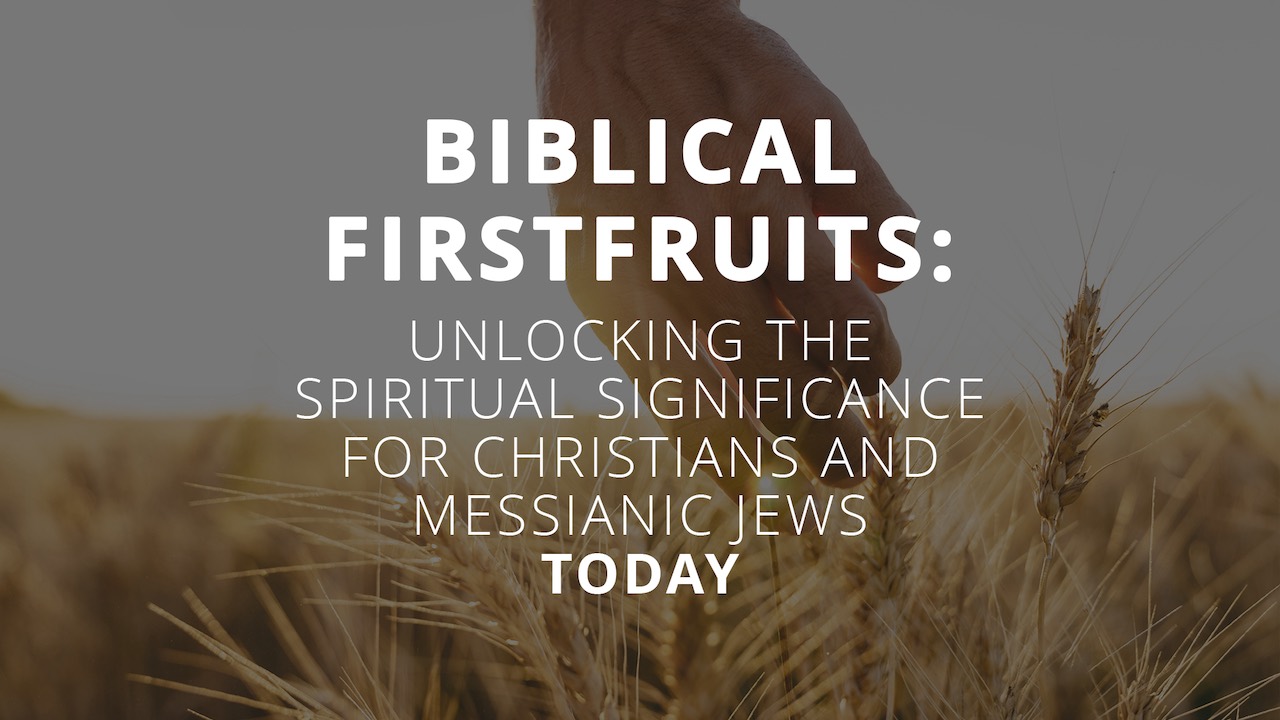Firstfruits in the Bible holds significant spiritual and symbolic meaning for followers of Yeshua – Jesus. The concept of firstfruits refers to the practice of dedicating the first and best portion of one’s harvest or income to God as an act of worship and gratitude. It is a way of acknowledging that all blessings come from God and expressing trust and reliance on His provision.
On the biblical calendar, springtime is densely packed with biblical holidays, namely:
Often lost in the shuffle of these appointed times is “Firstfruits” (Bikkurim / בִּכּוּרִים). Let’s look at what the Word of God says in Leviticus 23:9-11 (nasb) about first fruits,
Then the Lord spoke to Moses, saying, “Speak to the sons of Israel and say to them, ‘When you enter the land which I am going to give to you and you gather its harvest, then you shall bring in the sheaf of the first fruits of your harvest to the priest. He shall wave the sheaf before the Lord for you to be accepted; on the day after the Sabbath the priest shall wave it. (emphasis added)
The Children of Israel were expected to bring the first portion of the harvest as an offering to God in acknowledgment that everything was His (including the soil) and that He was trustworthy as their sovereign ruler (i.e., they wouldn’t starve). Aside from other points in the year, this practice was part of Israel’s Passover celebration and included waving a sheaf from the harvest. Biblical scholar Richard Rigsby notes:
Flavius Josephus (Ant 3.10.5) affirms that this was indeed a sheaf of barley. No additional harvest work could be accomplished before this ceremony was enacted. The second public occasion involving first fruits occurred seven weeks later, at Pentecost, when the first fruits of the wheat harvest were presented, as specified in Exodus 34:22. At this time, “the bread of the first fruits,” which was made from the initial wheat harvest, was offered; in Numbers 28:26, Pentecost is designated “the day of the first fruits.”
We can see that “firstfruits” is somewhat of a dynamic “liturgical event,” popping up at Passover, Pentecost, and other occasions throughout the year. It’s intriguing then, that many believers’ minds, “firstfruits” connects to Easter. We can probably blame Rabbi Saul for this association. The student of Gamaliel and Hebrew of Hebrews took the concept of “firstfruits” and transposed it into a gospel key in his letter to the believers in Corinth:
Messiah has been raised from the dead, the firstfruits of those who have fallen asleep. For since death came through a man, the resurrection of the dead also has come through a Man. For as in Adam all die, so also in Messiah will all be made alive.
–1 Corinthians 15:20-22 (tlv emphasis added)
Yeshua’s resurrection is the reality to which every firstfruits offering ever pointed. His offering of His flesh at Calvary and His glorious resurrection on the third day both epitomize everything this offering stands for, specifically, God’s sovereign rule over the whole of creation.
The first sheaf of barley was held up during the Passover with the full expectation that there would be more barley to follow because of God’s goodness. Likewise, we look at the Lord’s risen Body and find hope for our future knowing that “in Messiah will all be made alive”!
For Christians today, the concept of firstfruits carries important principles of stewardship, gratitude, and faith. It encourages believers to prioritize God in their lives, recognizing that everything they have comes from Him. It also encourages generosity and giving back to God and others, as an expression of love and worship. This day, serves as a reminder to trust in God’s provision and to honor Him with the best of what we have, whether it be our time, talents, or resources.
In summary, firstfruits in the Bible holds spiritual significance for Christians as an act of worship, stewardship, and trust in God’s provision. It embodies the principles of consecration, gratitude, and generosity, and serves as a reminder of God’s lordship and faithfulness in our lives.
Richard O. Rigsby, “First Fruits,” ed. David Noel Freedman, The Anchor Yale Bible Dictionary (New York: Doubleday, 1992), 797.
Today, Your Firstfruits Gifts Will Go To Empower Us to Reach, Teach, and Train the Nations with the Good News of Yeshua.
THANK YOU!




